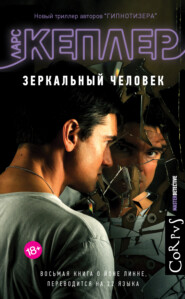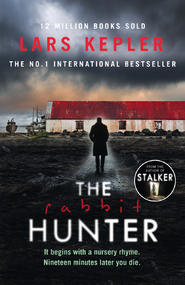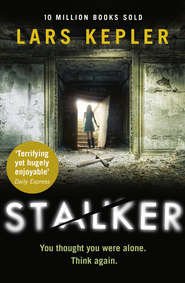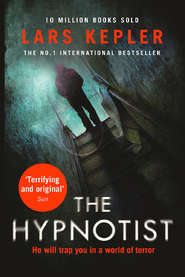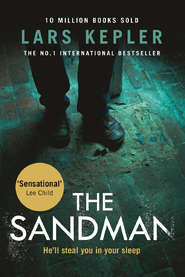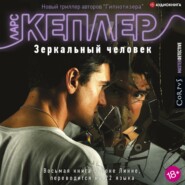По всем вопросам обращайтесь на: info@litportal.ru
(©) 2003-2024.
✖
The Nightmare
Настройки чтения
Размер шрифта
Высота строк
Поля
‘We need to find you a pair of shoes,’ she says.
He looks up at her with a blank expression, as though he doesn’t speak the language.
‘This isn’t over yet,’ she says. ‘You need to put something on your feet.’
Björn starts to hunt through the hall cupboard, pulling out flip-flops, wellington boots and old bags.
Avoiding all the windows, Penelope hunts as quickly as she can for a phone, checking the hall table, the briefcase on the sofa, the bowl on the coffee table, and among the keys and paperwork on the kitchen counter.
There’s a sound outside and she stops to listen.
Perhaps it was nothing.
The first of the morning sun is shining in through the windows.
Crouching, she hurries into the main bedroom and pulls out the drawers in an old chest. She finds a framed family photograph lying among the underwear. A portrait taken in a studio, a husband and wife and two teenage daughters. The other drawers are empty. Penelope opens the wardrobe, pulls the few items of clothing from their metal hangers, and takes a knitted jumper and a hooded jacket that looks like it would suit a fifteen-year-old.
She hears a tap running in the kitchen and hurries in there. Björn is leaning over the sink drinking from the tap. He’s wearing a pair of old trainers on his feet, a couple of sizes too big.
We have to find someone who can help us, she thinks. This is getting ridiculous, there must be people everywhere.
Penelope goes over to Björn and hands him the knitted jumper. Suddenly there’s a knock at the door. Björn smiles in surprise, pulls the sweater on and mutters about them finally having a bit of luck. Penelope walks towards the hall, brushing her hair from her face. She’s almost there when she sees the silhouette through the frosted glass.
She stops abruptly and looks at the shadow through the glass. Suddenly she can’t bring herself to reach out her hand and open the door. She recognises his posture, the shape of his head and shoulders.
The air feels like it’s running out.
Slowly she backs away into the kitchen. Her body is twitching, she wants to run, her whole body wants to run. She stares at the glass window, at the indistinct face, the narrow chin. She feels dizzy as she moves backwards, trampling on bags and boots, reaching out to the wall for support, running her fingers across the wallpaper, knocking the hall mirror askew.
Björn stops beside her, he’s clutching a broad-bladed kitchen knife in his hand. His cheeks are white, his mouth half open, his eyes staring at the window in the door.
Penelope backs into a table as she sees the door-handle slowly being pushed down. Quickly she goes into the bathroom and turns the taps on, then calls out in a loud voice:
‘Come in! The door’s open!’ Björn starts, his pulse is thudding in his head, he’s holding the knife in front of him, ready to defend himself, to attack, as he sees their pursuer slowly let go of the door-handle. The silhouette disappears from the window, and a few seconds later he hears footsteps on the gravel path beside the house. Björn glances to his right. Penelope comes out of the bathroom. He points to the window in the television room and they move away into the kitchen as they hear the man walk across the wooden terrace. Penelope tries to figure out what their pursuer can see, wondering if the angles and light will reveal the shoes scattered across the hall, Björn’s bloody footprints on the floor. The wooden terrace creaks again. He’s making his way round the house, towards the kitchen window. Björn and Penelope huddle up on the floor, pressing against the wall beneath the window. They try to lie still and breathe quietly. They hear him reach the window, his hands slide across the sill and they realise he’s looking into the kitchen.
Penelope notices that the glass door of the oven reflects the window, and in the reflection she sees their pursuer looking around the room. It occurs to her that he’d be looking her right in the eye if he happened to look at the oven door. It won’t be long before he realises that they’re hiding in there.
The face in the window disappears, they hear footsteps across the terrace again, then along the gravel path leading to the front of the house. When the front door opens Björn walks quickly over to the kitchen door, puts the knife down, turns the key that’s sitting in the lock, pushes the door open and rushes out.
Penelope follows him, out into the coolness of the garden. They run across the grass, past the compost heap and into the forest. It’s still fairly dark, but the first light of dawn is pressing between the trees. Penelope’s fear is chasing her, driving her on, churning up the panic in her chest again. She dodges thick branches, jumps over low bushes and rocks. Just behind her she can hear Björn, breathing hard. And behind him she can sense the other man the whole time, the man who feels like a shadow. He’s following them, and she knows he’s going to kill them when he finds them. She remembers something she once read somewhere. There was a woman in Rwanda who survived the Hutus’ genocide of the Tutsis by hiding in the marshes and running every day, running for all the months the genocide lasted. Her former neighbours and friends came after her with machetes. We imitated the antelope, the woman explained in the book. Those of us who survived in the jungle imitated the antelope’s flight from its predators. We ran, we chose unexpected paths, we split up and changed direction to confuse our pursuers.
Penelope knows that the way that she and Björn are running is completely wrong. They have no plan, no ideas, and that’s only going to benefit the man chasing them. There’s no guile to the way they’re running. They want to go home, they want to find help, they want to call the police. And their pursuer knows all this, he understands that they’re going to try to find people who can help them, that they’re going to try to find inhabited areas, heading towards the mainland and home.
Penelope tears a hole in her jogging bottoms on a fallen branch. She staggers a few steps but keeps going, only noting the pain as a burning snare round her leg.
They mustn’t stop. She can taste blood in her mouth. Björn stumbles through a thicket, they change direction at a fallen tree with a pool of water in the hole left by its roots.
As she runs alongside Björn, her fear suddenly brings to mind an unexpected memory, a memory of a time when she was just as frightened as she is now. It was when she was in Darfur. There was something about people’s eyes there, a difference in the eyes of those who had been traumatised, who couldn’t go on, and those who were still fighting, who refused to give up. She will never forget the children who came to Kubbum one night with a loaded revolver. She will never forget the fear she felt then.
21 (#ulink_e758dfbf-ceae-5ae0-a819-bf0f3f7b7f52)
The Security Police (#ulink_e758dfbf-ceae-5ae0-a819-bf0f3f7b7f52)
The main offices of the Security Police are on the third floor of the main block at Police Headquarters, with its entrance on Polhemsgatan. The sound of a whistle can be heard from the exercise yard of the prison, which is situated at the top of the same building. The head of the department for security measures is called Verner Zandén. He is a tall man with a pointed nose, dark, jet-black eyes and a very deep voice. He’s sitting with his legs wide apart on the chair behind his desk, holding up a calming hand. Weak light is coming in through the little window facing the inner courtyard. The room smells of dust and hot light-bulbs. In this unusually drab room stands a young woman named Saga Bauer. She is a superintendent, and has specialised in counter-terrorism. Saga Bauer is only twenty-five years old, and has green, yellow and red ribbons threaded through her long, blonde hair. She looks like a wood-nymph, always in the middle of a beam of light in a forest glade. She is wearing a large-calibre pistol in a shoulder holster beneath an open hooded jacket with the logo of Narva Boxing Club on it.
‘I’ve led the operation for more than a year,’ she pleads. ‘I’ve done the surveillance, I’ve spent whole nights and weekends …’
‘But this is something different,’ her boss interrupts with a smile.
‘Please … You can’t just ignore me again.’
‘Ignore you? A forensics expert from National Crime has been seriously injured, a detective superintendent has been attacked, the apartment could have exploded, and …’
‘I know all that. I’m on my way there now …’
‘I’ve already sent Göran Stone.’
‘Göran Stone? I’ve worked here for three years, and I haven’t been allowed to finish a single case. This is my area of expertise. Göran doesn’t know anything about …’
‘He did well in the tunnels.’
Saga swallows hard before replying:
‘That was my case too, I found the link between …’
Verner says seriously:
‘But it got dangerous, and I still consider that I made the right decision.’
She blushes and looks down, composes herself and then says calmly:
‘I can do this. It’s what I’ve been trained to …’
‘Yes, but I’ve already made my decision.’
He rubs his nose, sighs, then puts his feet up on the waste-paper basket under the desk.
‘You know I’m not here because of some equal opportunities programme,’ Saga says slowly. ‘I’m not part of any quota, I came top of my group in all the tests, I was the best ever at sniper fire, I’ve investigated two hundred and ten different …’
‘I’m just worried about you,’ he says weakly, looking into her clear blue eyes.
‘I’m not a doll, I’m not some princess or fairy.’
‘But you’re so … so …’
Verner turns bright red and then he holds his hands up helplessly.
‘Okay, what the hell, you can be in charge of the preliminary investigation, but Göran Stone is part of the team, so he can keep an eye on you.’






